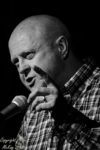 When we’re inviting people to contribute to our occasional features, there are two questions we ask. Do they have experience of the subject? Can they write about it in an interesting way? Ray Jones, CEO of Talentbanq , formerly Business Development Director at Time Out qualifies on both counts. He is passionate about live music and he knows how to write. It’s also fair to say that he’s seen a few gigs as well. So here’s what he came up with when we asked him to write about a memorable gig (and we certainly will be inviting him back):
When we’re inviting people to contribute to our occasional features, there are two questions we ask. Do they have experience of the subject? Can they write about it in an interesting way? Ray Jones, CEO of Talentbanq , formerly Business Development Director at Time Out qualifies on both counts. He is passionate about live music and he knows how to write. It’s also fair to say that he’s seen a few gigs as well. So here’s what he came up with when we asked him to write about a memorable gig (and we certainly will be inviting him back):
“The Windshield Wipers Slapping Time” – it was pouring as we waited in line to board the ferry to the Isle of Wight.
“I’ll take the 4×4” said my mate Bilko – and thank God he did. We were about to experience mud that made Glastonbury look a picnic. Fortunately we were also about to experience one of the best festival lineups of all times. The American Trilogy with nightly headliners – Tom Petty, Pearl Jam and The Boss.
With the ferry queue moving slowly – my 16 year old son CJ – heading for his first festival with dad, jumped out of the car with Bilko to get hot coffees. “Forward” shouted the guy from P&O so I jumped into the front and drove onto the ferry – and sailed away – without them.
The first of many memories from that wonderfully soggy weekend. Cars were being towed INTO Car Parks – tents were afloat on a sea of mud and wellies were getting stuck in the quagmire. And yet in amongst the mud, the blood and the beer were the smiles of people soaking up GREAT music.
Tom Petty on Friday night was a masterclass. The discomfort of rainwater trickling down our backs ignored as we took in the genius on stage.
I can’t remember when we saw Black Stone Cherry but they ripped it up, while the steamy wood-chip floor of The Big Top marquee seemed to be fermenting.
We met up with more friends. I have known Damian since we walked to primary school together. He and his wife were in one of those pre-sited Yurts. That’s the equivalent of The Ritz at IOW – and we did not let them forget it.
We partied quite hard to Madness on Saturday and Noel Gallagher was a fine warm-up on Sunday for what happened next – and that’s really what I had to share.
I’ve seen The Boss at Wembley, Hyde Park, The Olympic Park, Paris on the 4th of July and most memorably in his home state of New Jersey, but when he and the East Street Band walked out on stage at IOW2012 something magic happened.
The next three hours are a blur of singing, hugging, drinking, dancing and total admiration for a man and his band that delivered way beyond 100%.
We were exhausted when Mr Springsteen announced with a broad smile “We have a fucking boat to catch”
I have no idea if he made it because he broke into a massive, firework-festooned finale of “Twist and Shout” that had about 100,000 people partying in a way I had not seen at a festival before.
As we walked back to our tent my son said “Hey dad, this weekend has been the best thing I’ve ever done”
You can’t buy memories in Harrods! But you can make them at great festivals.
Thanks to wonderful people like John Giddings at Solo and Sarah Handy at Hard Rock I have many more memories of good times spent on the Isle of Wight, but those stories will have to wait. Maybe Music Riot will invite me back.
And here’s a little bonus from The Boss:
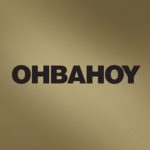 It’s the first album review of 2020 and we’re gently easing our way into the new decade. “Ohbahoy” (the title is taken from the name of Miles’ imaginary childhood friend) is an example of how to create a varied and very listenable album full of hooks without ever having to resort to vocal or instrumental pyrotechnics. The building blocks of this album are very simple hooks and riffs; the clever thing is the way the jigsaw is put together to create something that’s much more than the sum of the parts.
It’s the first album review of 2020 and we’re gently easing our way into the new decade. “Ohbahoy” (the title is taken from the name of Miles’ imaginary childhood friend) is an example of how to create a varied and very listenable album full of hooks without ever having to resort to vocal or instrumental pyrotechnics. The building blocks of this album are very simple hooks and riffs; the clever thing is the way the jigsaw is put together to create something that’s much more than the sum of the parts.
You won’t get very far into the album before realising that Miles has another useful songwriting talent; he knows how to take an influence and turn it into something that sounds vaguely familiar without sounding like a complete steal. And it’s not a criticism. I have a huge admiration for the musical magpies of the world; the people like Jeff Lynne and, more recently, Guy Chambers who recognise the tiny snippet that makes something work and morph it into their own compositions. The album’s opening song, “Hands Up”, is naggingly familiar, suggesting a distant relationship to Steve Miller’s “Abracadabra” (and Steve wasn’t above nicking a riff or two himself, “Rock ‘n’ Me” for starters). The trick with this game is to blend the influences into something completely new, which is exactly what Miles does. There are nods in the direction of many influences, Tom Petty (particularly in the uptempo rocker “Overpass”) and the Beatles jump out instantly, but there are undertones of The Cars, Steve Miller, ELO and probably many others.
There’s a lot to like about “Ohbahoy”. It’s a bunch of strong songs that’s interpreted by a band with enough talent and versatility to make four-part harmonies, twin guitar workouts and perfectly-judged horn parts sound like just another part of the day job. I have a sneaking suspicion that they might just be a bit tasty live as well.
“Ohbahoy” is out now in the UK.
 The difficulty is knowing where to start here. Michael McDermott’s output over the last two years as The Westies and a solo artist has been prolific and profound. Making up for lost time; who knows? Michael’s four years clean and sober; 2016’s “Six on the Out” and “Willow Springs” made references to his lost years, while “Out from Under” tells the whole story from degradation through rehabilitation to redemption, pivoting around the album’s central song “Out from Under” and the decision to take responsibility for his life.
The difficulty is knowing where to start here. Michael McDermott’s output over the last two years as The Westies and a solo artist has been prolific and profound. Making up for lost time; who knows? Michael’s four years clean and sober; 2016’s “Six on the Out” and “Willow Springs” made references to his lost years, while “Out from Under” tells the whole story from degradation through rehabilitation to redemption, pivoting around the album’s central song “Out from Under” and the decision to take responsibility for his life.
“Out from Under” isn’t just about the personal narrative; Michael’s been influenced by many different styles of American music and many of those influences surface on this musical journey. This is Michael’s story channelled through the American songbook. With a project this ambitious, you need a great team and it doesn’t get much better than Heather Horton on violin and vocals and Will Kimbrough on, well, anything with strings really.
The album opens with the brooding, menacing “Cal-Sag Road”; it’s about as low as you can get, a tale of drunkenness, sex and murder. It’s underpinned by Will Kimbrough’s atmospheric, ambient guitar sounds and the darkness of the arrangement mirrors the subject matter perfectly. The first half of the album runs through the ragtime resonator and banjo arrangement of “Gotta Go to Work”, the Southern boogie and “Sympathy For the Devil”-like backing vocals of “Knocked Down” to the Tom Petty-esque “Sad Songs”, depicting the malaise and lassitude of the music business. And then you hit the bottom.
“This World Will Break your Heart” is a pathos-packed series of vignettes pulling in dropouts, miscarriages and loneliness in old age. It’s the most heart-breaking song on the album and you know that things have to brighten up from here on in. And they do; It’s big, it’s anthemic and it has a hint of Springsteen. “Out from Under” is a floor-tom-driven monster of a song that’s as uplifting as anything you’ll hear this year. It’s the way forward, pointing the way for the second half of the album beginning with the idyll of “The Celtic Sea” where a sea voyage serves as a metaphor for the beginning of a redemptive relationship; it’s turbulent at first, but the crew pull together and the voyage looks set to succeed.
The three songs which follow are pure, joyous, celebration of love. “Rubber Band Ring” is a horns and Hammond Motown-style stomper, “Never Goin’ Down Again” sets a commitment to reform against a stadium rock background, while “Sideways” combines gorgeous Stax stylings with a lyrical style that leans towards Dylan or early Springsteen. And then you have the gentle acceptance of a new life in “God Help Us”.
“Out from Under” is a hugely ambitious album that follows Michael McDermott’s personal narrative and succeeds in combining an exploration of the highways and byways of American popular music with creative and poetic lyrics. I haven’t heard anything better this year.
“Out from Under” is released in the UK on Friday May 18, 2018.
Don’t take my word for it, listen to it here and then buy a copy.
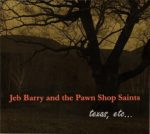 Twenty songs over a double CD (well, nineteen actually, one’s a bonus download); you’re never quite sure what message that sends. The official line is that some songs work with band arrangements, some are best as solo/duo arrangements and that’s the way they’ve been split. Personally, my response to studio double albums is one of wariness; could it have been better as a single? We’ll see.
Twenty songs over a double CD (well, nineteen actually, one’s a bonus download); you’re never quite sure what message that sends. The official line is that some songs work with band arrangements, some are best as solo/duo arrangements and that’s the way they’ve been split. Personally, my response to studio double albums is one of wariness; could it have been better as a single? We’ll see.
The common theme across the two albums is obvious. It’s not just Texas, but the southern states and the mentality of small-town America. The melodies are good, Jeb Barry’s voice is striking, cracking with emotion at times, but the real power is in the lyrics. He knows how to tell a story and how create a memorable phrase, a lyrical hook that’s as potent as the melodic ones. In “El Paso Sucks”, there’s a reference to the woman being ‘sideways on champagne’ while “Southern Oak” (taking the opposite tack from the marvellous “Speedtrap Town”) makes the observation that ‘hell and high water make good roots’. And let’s not forget the observation from “Miss Mississippi” that ‘drunk and stupid’s no excuse’.
The playing on the album is all in the service of the songs. You won’t find any lengthy solos or massive riffs, everything’s there to get the message of the song over, whether it’s lovely harmonies or the good old sus4 to create a Byrds/Tom Petty feel on “If This Heart Had Walls”. There’s nothing to take a strong dislike to and there are plenty of strong songs. The download-only song “Speedtrap Town” is a real standout, warning of the literal and metaphorical dangers of straying away from the highway.
And that thing about double albums? Well, I’m still not convinced. I would love to hear a single album edit of this set of songs, but I wouldn’t want to fall out about it.
“texas, etc.” is released on April 27th on Dollyrocker Records (DR-2018-01).
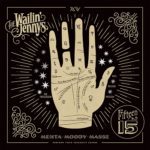 This was the first album I listened to on January 1 2018. Kind of appropriate really; after hearing so much beered-up musical stodge over the festive period, this is the perfect aural January detox to accompany the real thing. The Wailin’ Jennys (Heather Masse, Nicky Mehta and Ruth Moody) have been together fifteen years (hence the title), but this is their first album in six years. It’s worth waiting for; it’s gorgeous. They interpret nine very different songs but the common thread running through all of them is those three fabulous voices and the heartbreakingly pure harmonies. It’s possible I might mention that again at some point.
This was the first album I listened to on January 1 2018. Kind of appropriate really; after hearing so much beered-up musical stodge over the festive period, this is the perfect aural January detox to accompany the real thing. The Wailin’ Jennys (Heather Masse, Nicky Mehta and Ruth Moody) have been together fifteen years (hence the title), but this is their first album in six years. It’s worth waiting for; it’s gorgeous. They interpret nine very different songs but the common thread running through all of them is those three fabulous voices and the heartbreakingly pure harmonies. It’s possible I might mention that again at some point.
Everything is built around creating a setting for those flawless voices to deliver interpretations that are technically and emotionally perfect. Generally speaking, the musicians have a fairly light touch throughout the album; this is all about putting those three voices straight upfront and centre. When full string band arrangements are used, they tend to build up in layers to push the song to a higher level, which works particularly well on the timely cover of Tom Petty’s “Wildflowers” and the Jane Siberry song, “The Valley”. “Boulder to Birmingham”, Emmylou Harris and Bill Danoff’s plaintive elegy to Gram Parsons has a full band sound with some lovely two-guitar picking and percussive upright bass; none of it threatens to overwhelm the vocals.
For all the subtle and delicate playing, the a cappella or virtually a cappella material that really shines brightly. Paul Simon’s “Loves Me like a Rock” gets the handclap and fingerpop treatment, Dolly Parton’s “Light of a Clear Blue Morning” begins with a solo vocal before the stunning harmonies join, but the best is saved till last. The album’s final song is an a cappella cover of Hank Williams’ “Weary Blues from Waitin’” which not only has the expected beautiful three-part harmonies but features some incredibly precise three-part glissando harmonies. I have honestly never heard that done with such precision.
So now you’re going to ask if I like it, yeah? What a great way to start the year. But you don’t have to take my word for it; a click on any of those song links will take you to Spotify where you can hear it for yourself.
“Fifteen” is released on True North Records on Friday January 5 2018.
 “Gold Rush” is Hannah Aldridge’s second album and it moves Hannah in a slightly different direction. Her debut “Razor Wire” (and an excellent debut too) was built around a set of country-inflected, mainly acoustic, guitar songs with the emphasis on personal experiences. That emphasis is still there on the second album but Hannah’s added a rockier edge which is evident in her switch from acoustic to electric guitar (Telecaster if you must know) and her description of her newer songs as Southern rock. “Razor Wire” was a huge favourite with the Riot Squad, so how does “Gold Rush” compare?
“Gold Rush” is Hannah Aldridge’s second album and it moves Hannah in a slightly different direction. Her debut “Razor Wire” (and an excellent debut too) was built around a set of country-inflected, mainly acoustic, guitar songs with the emphasis on personal experiences. That emphasis is still there on the second album but Hannah’s added a rockier edge which is evident in her switch from acoustic to electric guitar (Telecaster if you must know) and her description of her newer songs as Southern rock. “Razor Wire” was a huge favourite with the Riot Squad, so how does “Gold Rush” compare?
The title song, which closes the album, is a work of rare beauty; it’s more delicate than most of the new songs and deals with the idea of being at a point in time when looking forward and looking back are equally painful. When a writer can create the line ‘I don’t know if this is living or slow motion suicide’, you know you’re hearing a special talent. But “Gold Rush” isn’t about one song, there are nine more and they’re little firecrackers. The album’s first song “Aftermath” kicks open the doors with tribal drums and a tight rhythm section dragging “Jumping Jack Flash” into the twenty-first century. “Dark-Heated Woman” is sinister and menacing with a guitar solo that Neil Young would be proud of and “Living on Lonely” is plaintive, almost heart-breaking, with huge choral backing vocals. “Burning down Birmingham” is Southern rock with the trademark slide guitar hook and an insanely catchy chorus while “Shouldn’t Hurt So Bad” draws heavily on the Merseybeat/Byrds/Tom Petty jangly guitar stylings. And so it goes on, there are ten very good songs and a huge dynamic range.
Everything fits into place perfectly as Hannah moves effortlessly from the slower, more controlled, vocals to the raw and raunchy rockers. She ticks all the boxes; the songs are powerful, heart-rending, even harrowing at times, her voice is stunningly good and she has tremendous live presence. “Gold Rush” is an album created by someone who has seen and done too many things in a short life; it’s shot through with substance abuse references and some regrets, but no self-pity. The overall message is that this a testament from a survivor and we should all feel grateful for that. And one final great line for you, from “I Know Too Much”: ‘I don’t need another reason to hate myself, I don’t need another bad tattoo’.
This is a beautiful album that you will go back to again and again.
“Gold Rush” is released in the UK on Friday June 16 and you can find Hannah’s July UK tour dates here.
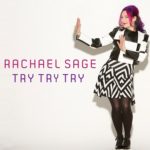 Despite all the dire predictions, there’s still an awful lot of really good music out there at the moment. The downside of this is that it can be difficult to make your songs stand out from the rest. Rachael Sage passes the old grey whistle test on “Try Try Try” with a slightly unusual arrangement, using a combination of slightly distorted violin and electric guitar as lead instruments and a mix of electric and acoustic guitars. It’s easy to see why this made number six on the radio chart in the US; it opens like a Tom Petty song before the intimate, close-miked vocal cuts through, followed by an outrageously catchy violin hook. For the soul fraternity, there’s horns and a Hammond; there’s even a violin solo closely followed by a guitar solo and an acoustic breakdown. All the elements for a great single are there and they’re put together beautifully.
Despite all the dire predictions, there’s still an awful lot of really good music out there at the moment. The downside of this is that it can be difficult to make your songs stand out from the rest. Rachael Sage passes the old grey whistle test on “Try Try Try” with a slightly unusual arrangement, using a combination of slightly distorted violin and electric guitar as lead instruments and a mix of electric and acoustic guitars. It’s easy to see why this made number six on the radio chart in the US; it opens like a Tom Petty song before the intimate, close-miked vocal cuts through, followed by an outrageously catchy violin hook. For the soul fraternity, there’s horns and a Hammond; there’s even a violin solo closely followed by a guitar solo and an acoustic breakdown. All the elements for a great single are there and they’re put together beautifully.
“Try Try Try” is released on Friday September 30th and Rachael’s album “Choreographic” follows on Friday November 11th on Mpress Records.
If you want to see Rachael in London, she’s playing at The Troubadour on Friday September 23rd.
Here’s the audio-only clip of the single:
 I had the opportunity to meet up with MusicRiot favourite Hannah Aldridge just before her sold-out show at Green Note in Camden which is part of her current tour with Lilly Hiatt, taking in Northern Europe, England and Scotland. We talked about her new album, her previous album “Razor Wire” and a lot of other things along the way:
I had the opportunity to meet up with MusicRiot favourite Hannah Aldridge just before her sold-out show at Green Note in Camden which is part of her current tour with Lilly Hiatt, taking in Northern Europe, England and Scotland. We talked about her new album, her previous album “Razor Wire” and a lot of other things along the way:
Allan – Good to see you again, Hannah.
Hannah – Good to see you too.
Allan – Back in the UK and you’ve been doing a European tour as well.
Hannah – I have, yes.
Allan – How did that go?
Hannah – It’s been really good actually. We did the Netherlands; I went back to Hamburg and played and I’ll be doing Norway at the end of it. It’s always fun to do Europe in general but it was fun this time because I explored a new market, which was the Netherlands. I haven’t played there before; it’s definitely different and it’s good to keep moving forward and forge new territories, so that was the goal this time.
Allan – I think Northern Europe really gets Americana doesn’t it?
Hannah – Well, I think from my perspective, the people who really appreciate what I do are people who can speak English well enough to understand the lyrics because, as much as I don’t want to admit this, my music is not quite as interesting without the lyrics. I wouldn’t call myself a really interesting guitar player or anything and I wouldn’t want to listen to me if I couldn’t understand what I was saying. That’s such a big part of it, and what I’ve noticed is that people who speak English fluently are the ones that gravitate towards what I’m doing.
Allan – And you’re doing a mini tour of Scotland this time.
Hannah – I am doing Scotland. I was trying to think if I’ve ever done a show in Scotland. I’ve been there, but I don’t think I’ve ever played there.
Allan – I think, like Northern Europe, Scotland really gets Americana as well and I don’t think country ever really went away in Scotland.
Hannah – It’s really interesting the UK how every country has subtle differences in the music they like. Ireland is very different than England in terms of musical taste and Scotland I assume would be the same, but I’m not really sure what to expect because I haven’t played there.
Allan – Well I grew up in Scotland, and Scots like good songs. They like a good melody but they like a message as well.
Hannah – Well that’s good to know; hopefully they’ll like what we’re doing.
Allan – And I think the rooms that you’re playing tend to attract appreciative crowds.
Hannah – I’ll look forward to it; that makes me feel good about it.
Allan – Just to go back in time a bit, which artists would you say influenced you when you were growing up.
Hannah – That’s interesting, because I didn’t really start writing music until my early twenties, so nobody really influenced me growing up because I didn’t want to be a musician until my twenties. That being said, there were a lot of artists that I listened to growing up that now influence me, Bonnie Raitt being one of them and Tom Petty being another. I was thinking earlier, someone asked me in an interview what three artists have shaped me as a musician and I looked at him and said Gillian Welch, Bonnie Raitt and Tom Petty.
It’s interesting because sometimes I actually feel like I’m writing something that sounds like a mix of those things, so I do think those people do heavily influence me but, at the same time, there’s so much I’ve listened to since that really shaped me too. I think Gillian Welch gave me permission as a female to write like a man and I didn’t discover her until later; she was very influential. And Bonnie Raitt gave me permission to play with the boys too and to stand up and be respected the same way that a man is and if there are any female musicians I can think of that men are shamelessly devoted to in terms of musicality, it would be Bonnie Raitt and Gillian Welch, and that’s pretty cool because a lot of the time you’ll hear ‘I don’t know, it’s a girl, I don’t like girls with a guitar’, but Gillian Welch and Bonnie Raitt seemed to break out of that, so that was cool for me too.
Allan – And what about your Dad (Walt Aldridge, Muscle Shoals songwriter and performer), did he influence you either way?
Hannah – In my decision to be a musician or in my musical pedigree…
Allan – In your decision to be a musician…
Hannah – He strongly tried to influence me not to be a musician and, because of the personality I am, that actually pushed me in the other direction very hard and I thought ‘OK, we’ll see’. He’s really tough about that kind of stuff – he’s not easy to impress and it’s a different level when it’s your kid. It’s really hard to be objective about what they’re doing so he really, to this day, he calls and says ‘Why are you doing this? You can do things that pay a lot more’ and I say ‘The same reason you did it’.
It’s really interesting that what I’ve learned with him is that we function better when we don’t talk about music because we have such different opinions on it and we’re in such different markets. He was making music at a time that it was just totally different.
Allan – So, if you had to put a label on your music, what would you call it?
Hannah – I wouldn’t call it Americana, because I don’t really know what Americana is and it’s really hard for me to justify putting myself in a genre where I go ‘I don’t know what this is’, but in the same way, whatever genre you would put Ryan Adams and Bonnie Raitt and Gillian Welch in, whatever box you put them in, I guess I would fit in the same box. I think my description of my music is probably very different than other people’s, which is strange too. My description of it would be Southern rock, something like that. Singer/songwriter, Southern Rock; I’m a confused person. I’m confused when I walk out of the house every day about what to wear because I don’t know who I am half the time, so maybe some days I look like this and some days I look like that and it’s the same with writing. I think I’m constantly on a journey to figure out who I am in general but also as a musician so that makes it really hard for me to say ’This is what kind of music I do’.
Allan – I noticed you’ve created a lot of different visual identities over the years…
Hannah – I have, and think it’s become a part of the whole thing in that I‘m constantly trying to figure out what works for me as a person, and I think, more than any kind of steady identity I could give, that’s actually more reflective of me as a person than anything, that I’m constantly trying to figure out who I am and where I fit in to the world and I think that does change a lot for me. I played a show in Nashville a while ago and a big booking agent came out and they said to me ‘You know, I really, really like your music, but the look just doesn’t go with the music.’ And I laughed and said ‘Really, what is the look supposed to be, because I’ve been trying to figure that out for twenty-eight years.’ (Laughs). I think I’m just always going to be trying to reinvent myself, and I think Ryan Adams gave me permission to do that. He’s made it work, musically, and I hope to do the same.
Allan – Do you see more as a writer or a performer?
Hannah – A writer, absolutely a writer because what I really wanted to be was a staff writer. What I really wanted to do when I started this whole thing was to be a writer for film and TV. I wanted to be the person that sat in my room in my pyjamas and a bowl of cereal and made really dark music for horror movies, you know. It’s really interesting how fate, or whatever you may call it, pushed me down this path of being an artist and I reluctantly was like ‘I don’t wanna do this. I hate being on stage’. I was joking with Lilly (Hiatt) that, literally, before big shows for the first couple of years performing, I would watch Michael McDonald videos before to keep me from having anxiety, because you can’t have anxiety while you’re watching “Ya Mo Be There”, you just can’t. I would really have to push myself to do these things because I felt uncomfortable. Now, I love performing, I think it’s great and I see all the wonderful things about it, but it was definitely not something that just came naturally to me. I felt very intimated buy it and really I‘ve always enjoyed the process of being creative. So, I think in that way, I’m definitely more of a writer than a performer, you know.
Allan – “Razor Wire” (Hannah’s debut album) felt like a really personal album and it felt like there was a lot of autobiography in there as well…
Hannah – “Razor Wire” was an autobiography of where I was in my love life in a lot of ways. At that point in my life I was going through a divorce and I was trying to find out if I was capable of ever loving again and what that meant and if was a complete screw-up and all of these things and meanwhile also writing about my experiences with these other guys I was going out and dating and then at the same time. Songs like “Black and White” were what was going on in my personal life with Jackson (Hannah’s son), being a young mom, those kind of things. “Razor Wire” was definitely very autobiographical.
My new record that I’ve been writing also is, but in a very different way. I kind of went backwards and started writing about my life before that when I was a really heavy drug user and a really bad drunk and everything that led me to that point and trying to sort through all those feelings, growing up super-religious and feeling alienated by that and also fast-forwarding a bit to the age that I am now, approaching my thirties and being fearful of that. So that chunk of time was “Razor Wire” and I think the new record is a bit of a prequel to that. I think it’s what I write best; I’m not good at that third person stuff, so it was definitely a very personal record.
Allan – I played a copy of “Razor Wire” to a friend in radio and he said that there were three hits, if you could actually get them out there.
Hannah – That’s the thing that’s tough about it. It’s all about PR when you get to the point that I’m at now. It’s about somebody recognising that you’re worth putting money into because you’ve got the songs and you’re slowly building up to that point, but I watch it happen with people all around me and you go ‘Well, I’ve got good songs too’. All you can do is just (Lilly and I have talked about this a lot since we’ve been on the road together) stay focused and say ‘I’m gonna keep writing good songs’ and know that it’s not about me, whether or not it’s a hit. It’s about the fact that I don’t have millions of dollars to put into promotion. One day maybe I will, but until then all I can do is continue to write great songs.
Allan – If the catalogue of songs is there and the break comes…
Hannah – Absolutely. You can have the publicity but without the songs it doesn’t work very well. I’ve seen that happen a lot with people around me too where they get that shot and they don’t have the material to back it up. I’m not saying I absolutely have the material, but I think that it’s important to really focus, until you get your shot, on working up to that so that you’re ready for it. If I had the opportunities I wanted when I first released “Razor Wire”, I probably wouldn’t have performed well on Conan O’Brien or performed very well at The Ryman, which are the dreams that I have, but I have to recognise that I have to put in the time to get there so that when I do have those shots, I really kill it and that takes time. All of this takes a lot of patience.
Allan – I guess Maverick (festival in Suffolk) is one of those opportunities isn’t it?
Hannah – Sure. Maverick is really cool. I love playing there because it’s one of those things where I get to connect with a lot of different artists and the other thing that’s really cool about is that everybody that I see around England, I can see them all in the same place and that’s really cool. I see some really devoted fans, the promoters that have helped me so much, the Americana UK people and artists and it’s really neat for me because it’s everyone in one vicinity and I really enjoy Maverick Festival every single year.
Allan – You mentioned the new album briefly. How’s that going at the moment?
Hannah – It’s going awesome. I’ve got everything written and I’ll be recording as soon as I get home and I’ll be done by July 30th and from there it’ll just be setting a release date. I think it’s gonna be great; it’s funny because the producer the producer that’s doing the record this time around, I wrote “Save Yourself” with, he’s someone I’ve played with and he’s someone I’ve written a lot of songs about as well. We grew up together actually and he’s so in tune with my music that it just made sense to get him to produce the record and he’s taken the songs and shaped them in a way that I can’t do. That’s really cool because I’ve never had that before where I wrote a song and gave it to somebody else and let them manicure it a little bit. It’s like adding a whole new level to the songs and that’s really cool. I’m really excited to hear how they all end up.
Allan – Well the one that I’ve heard, that you played here last time, “Goldrush”, hit me instantly and it’s rare that a song does that.
Hannah – I’m glad that you like that. I really like that song. Usually I have a good gut feeling about a song when I like one or, if it makes me a bit teary when I sing it the first couple of times, I know it’s good. Actually I had two killer co-writers on that song and that concept was so complicated for me to sort through in my mind that I called two people that I thought ‘I know they can help me’ because I don’t want to take that song idea to just anybody because I knew it could be a really cool song, so I called up two people I knew could really help me tie up the loose ends on it. I sat and talked to them about the idea and said ‘This is what I’ve got written and I don’t know how to tie this in’ and they helped me put that together so I’m really grateful for them helping me do that. I do love that song. I think it’s a good one, I think it’s meaningful and I think it approaches a topic that people don’t wanna talk about, which is getting older, so I’m glad that you like that one.
Allan – And you’re going electric this time round…
Hannah – I am going electric this time round. I was nervous as could be. I had dreams before this tour that I got out on the road and my electric didn’t work, because I’m so comfortable with my acoustic guitar, but I’m making a point with this record to really push myself and I’m trying to push out of that box that people are putting Americana in because I don’t have to be this certain thing because you’re put in Americana, it’s so broad, you know, and I really wanted to push the boundaries of what people thought of me as an artist and maybe what they think I’m gonna put out musically. I wanna stay within reason and not get too crazy, but try to get myself out of my comfort zone. I felt like a lot of these songs are meant to be played on electric and it doesn’t make sense to go out with an acoustic and try to play them; they just don’t translate so I’m literally learning in front of people on this tour how to deal with this electric guitar because I play it at home and I write on it, but I don’t go on tour with it very often, and if I do, I have a band behind me, it’s not just me standing up there with an electric. At this point in the tour, I feel really comfortable. The first day or two, I was sweatin’ bullets up on stage trying to figure out how to do everything, but it’s fun and it adds something interesting for me because it’s so easy to get bored when you play songs hundreds and thousands of times and you think ‘I don’t wanna play this song anymore’, but it’s been fun to revisit “Razor Wire” on the electric.
Allan – One final question. Have you got a song, yours or someone else’s that makes you cry?
Hannah – I have some of mine that make me cry. Other people’s songs? Pretty much any John Moreland song ever written; those make me cry. “God’s Medicine”, “Cherokee”; pretty much all of his songs are so damned good, I would say every John Moreland song and “Hallelujah” does as well; that song always gets to me too because there’s a couple of lines in there that really speak to me on a lot of levels.
Allan – Thanks very much Hannah.
Hannah and Lilly will be playing the Voodoo Rooms in Edinburgh on June 21st, The Blue Lamp in Aberdeen on the 22nd and Music in the Suburbs in Glasgow on the 23rd.
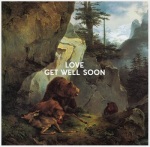 I know there’s an awful lot of good music out there, but it’s still a shock to hear something as good as “Love” and realise that Get Well Soon and its creator Konstantin Gropper, have been around since 2008. Admittedly he’s better known in his native Germany and also better known as a film composer, but an album of this quality makes you wonder why he isn’t better known generally. This is his fourth album and you can probably guess the theme from the title but this isn’t a chocolate-box, hearts and flowers version of love, it’s a bit more complicated than that.
I know there’s an awful lot of good music out there, but it’s still a shock to hear something as good as “Love” and realise that Get Well Soon and its creator Konstantin Gropper, have been around since 2008. Admittedly he’s better known in his native Germany and also better known as a film composer, but an album of this quality makes you wonder why he isn’t better known generally. This is his fourth album and you can probably guess the theme from the title but this isn’t a chocolate-box, hearts and flowers version of love, it’s a bit more complicated than that.
Gropper is highly literate and his take on the theme of love emphasises the mystery and the messiness against a constantly morphing musical background. The press release for the album helpfully supplies a list of artists that Gropper was listening to while making the album, and some of them are fairly evident in the finished product with a strong hint of early Tom Petty on “It’s Love”.
At times, the album has a symphonic feel; the opening song “It’s a Tender Maze” has an intro which is partly influenced by Eastern music and partly the sound of an orchestra tuning up before a performance, while the final song, “It’s a Fog” brings the album to a brass-led, raucous conclusion. Along the way, there are elements of disco in “Young Count Falls for Nurse”, St Etienne-flavoured pop in “It’s a Catalogue”, jangly indie in “Marienbad” and a Richard Hawley retro sixties influence in ”I’m Painting Money”. The musical quality and variety is everything you’d expect from someone who soundtracks films, and the lyrics are outstanding.
Gropper’s natural lyrical style is laced with cynicism which manifests itself here as a sense of puzzlement at the manifestations of love and the way in which it’s painted by our consumer society as he focusses on the strange and sometimes grubby aspects of the phenomenon. “It’s Love” is a song celebrating first love, but the reference to blood-stained knickers pulls it back into the physical world with a jolt. “33” is a series of little observations of the life of a person whose life has stagnated at that age and has a couple of fine lyrics which demonstrate Gropper’s wry, almost sarcastic, style: ‘your green batik doesn’t fit you no more, that’s a shame ’cause Batik’s coming back’ and ‘this year you are 33, but when you cry you still look 16’ wouldn’t sound out of place on a nineties Babybird album.
“Love” is a fascinating attempt to explore a theme that defies logical explanation. Konstantin Gropper’s answer is to admit that he doesn’t have a clue while painting perfect miniatures of the experience of love or its absence against a hugely varied set of arrangements. It works superbly.
Out now on Caroline/Universal (CAROLO10CD).
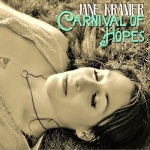 I’ve got this feeling about 2016; any year that starts with an album as beautiful as Jane Kramer’s “Carnival of Hopes” can’t really go wrong. This is a stunningly good album where every detail is right; the arrangements are varied, the melodies are powerful and Jane’s vocal delivery moves effortlessly from pure and clear to cracking with emotion. As for the songs, they’re raw, honest, self-deprecating and poetic, as Jane explains: ‘“Good Woman” is the song you write when your lover kicks you out of the house and you’re half drunk on cheap box wine in a crappy motel room staring at yourself in the mirror under the fluorescent bathroom light, you can’t help but be honest then.’
I’ve got this feeling about 2016; any year that starts with an album as beautiful as Jane Kramer’s “Carnival of Hopes” can’t really go wrong. This is a stunningly good album where every detail is right; the arrangements are varied, the melodies are powerful and Jane’s vocal delivery moves effortlessly from pure and clear to cracking with emotion. As for the songs, they’re raw, honest, self-deprecating and poetic, as Jane explains: ‘“Good Woman” is the song you write when your lover kicks you out of the house and you’re half drunk on cheap box wine in a crappy motel room staring at yourself in the mirror under the fluorescent bathroom light, you can’t help but be honest then.’
The album’s two centrepieces, “Good Woman” and “Carnival of Hopes” are its two longest songs; they’re not long because of any self-indulgence, but because that’s how long they need to be to tell the story. Both titles are deliberately misleading; the opening line of the first is “I’m not a good woman” (we might disagree on that) and the second is about a “busted carnival of hopes”. Throughout the album, Jane Kramer uses a lyrical sleight of hand to almost constantly portray herself in a self-deprecatory and even self-denigrating light. The opener “Halfway Gone” sets the tone with the line ‘I walk like a Clydesdale horse – I cuss and carry on’ and the album’s lyrics continue in the same vein until “Truth Tellin’ Lies” and “My Dusty Wings” finally suggest an attempt at redemption and renewal.
The Appalachian instrumentation of banjo and fiddle features strongly on the album along with Dobro, but the stylings vary immensely across the album from a stripped-back version of Tom Petty’s “Down South” with multi-tracked harmonies and a Celtic feel, to the New Orleans horns meets Rickie Lee Jones vibe of “Why’d I Do That Blues” with its trumpet and trombone solos (you could sell it to me on a good trombone solo alone).
The narrative of the album is one of moving forward, starting with lows and moving steadily along to the positive ending, taking in images of frontier life along the way with animals, fishing, maps, engines (and of course drinking) acting as metaphors throughout the superbly crafted and intensely personal lyrics. It may sound laid-back and almost casual at times, but these are the songs of a very gifted and honest writer.
“Carnival of Hopes” isn’t just a great Americana album, it’s a great album where the quality of the songwriting and performance transcend any concept of genre.
Available now at CD Baby.


